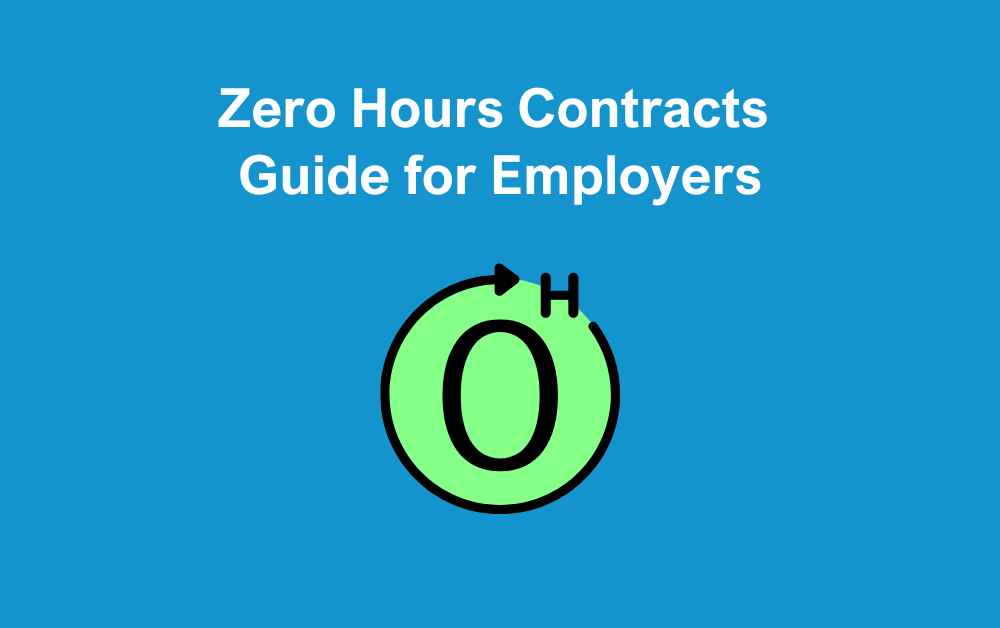Zero hours contracts have become a prominent feature in the modern workplace, sparking considerable debate among employers, employees, and policymakers. These contracts, which do not guarantee a minimum number of hours, provide flexibility for both businesses and workers but also raise questions about job security, employee rights, and fair treatment.
For employers, this can feel like a good solution for managing fluctuating demand, while workers may benefit from the freedom to take on work as it suits them. However, the lack of guaranteed income and potential issues around employment status and rights make these contracts a complex topic.
This guide explores what zero hours contracts are, their benefits and challenges, and best practices for managing these contracts responsibly.
What are zero hours contracts?
This is an agreement between employers and employees that do not guarantee a set number of working hours. While they offer flexibility, they also carry a certain level of insecurity for workers. Employers often use these contracts to adapt quickly to changing workforce demands, filling shifts as needed without committing to specific hours.
You cannot prevent a zero-hours worker from seeking or accepting work with other employers. The law allows them to disregard any contract clause that prohibits them from:
- looking for other employment
- accepting work with another employer
Additionally, you remain responsible for the health and safety of staff on zero hours contracts.
Employment Status
Zero-hours staff should be legally classed as either “employees” or “workers”. According to Acas, these worker’s rights are directly linked to their employment status.
Zero Hours Contracts Rights
Employees on zero hours contracts have specific rights under UK employment law, including:
- National Minimum Wage: Zero hours employees are entitled to receive the National Minimum Wage or National Living Wage, depending on their age.
- Paid Holiday: workers accrue holiday entitlement based on the hours they work.
- Protection from Discrimination: Like any other employee, these workers are protected from discrimination and unfair treatment.
- Right to Work for Other Employers: Exclusivity clauses preventing employees from working for other employers are illegal in zero hours contracts.
- Rest Breaks
- Receiving Payslips
When Employers Use Zero Hours Contracts
One of the main reasons employers opt for zero hours contracts is for short-term staffing solutions. This is particularly popular in the retail and hospitality sectors where the volume of customers fluctuates throughout the day and certain times of the year. for example:
- Seasonal Peaks: For example, retailers may need extra staff over the Christmas period.
- Event-Based Work: These contracts are common in hospitality and events where staffing needs can vary significantly.
- Ad Hoc Work
Challenges and Considerations
While flexible, zero hours contracts come with potential downsides for employers:
- Unreliable Availability: As employees are not obligated to accept work, it can be challenging to rely on staff for critical operations.
- Employee Satisfaction and Retention: this can lead to dissatisfaction if workers seek more stable, guaranteed hours. Employers must consider the impact on staff morale and retention.
- Legal and Ethical Considerations: employees should be treated fairly and provided with their statutory rights. Misusing these contracts can lead to reputational damage and potential legal challenges.
Best Practices for Zero Hours Contracts
To make the most of zero hours contracts while remaining fair and compliant with UK law, consider these best practices:
- Clear Communication: Outline the expectations for availability, pay, and work arrangements in the contract to avoid ambiguity.
- Respect Flexibility: While flexibility is a core aspect. Therefore, it’s essential not to penalise workers who cannot accept shifts.
- Ensure Compliance: Make sure contracts meet all legal requirements, including minimum wage, holiday pay, and health and safety standards.
- Foster Good Relations: A fair approach can help build trust and a positive relationship with workers, improving their loyalty and willingness to work when needed.
- Regularly Review Contracts: Periodically review the use of zero hours contracts to ensure they remain suitable for the business needs and that the terms align with current employment law.
Alternatives to Zero Hours Contracts
While zero hours contracts offer flexibility, there are alternatives that may provide more stability for both employer and employee:
- Fixed-Term Contracts: These contracts specify a set employment period, which can be suitable for projects or seasonal needs.
- Part-Time Contracts: If a role requires regular hours, a part-time contract may provide a better balance of stability and flexibility.
In Conclusion
Zero hours contracts can offer valuable flexibility for businesses, allowing them to adapt to changing demand efficiently. However, it’s crucial to approach these contracts thoughtfully to avoid issues related to employee satisfaction, legal compliance, and ethical practices. By following best practices and considering alternative options where appropriate, employers can effectively integrate zero hours contracts into their workforce strategy while maintaining a positive working environment.







